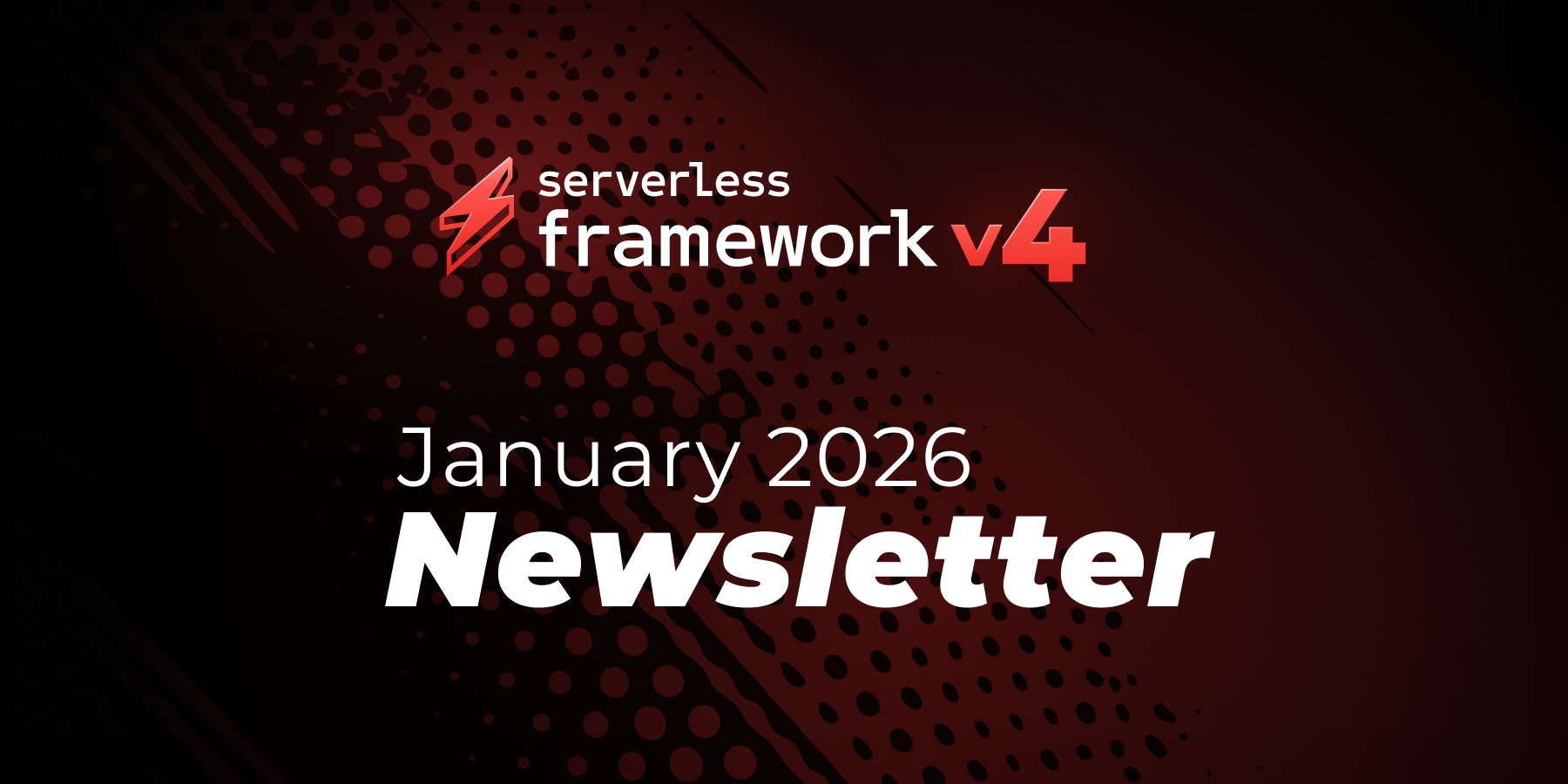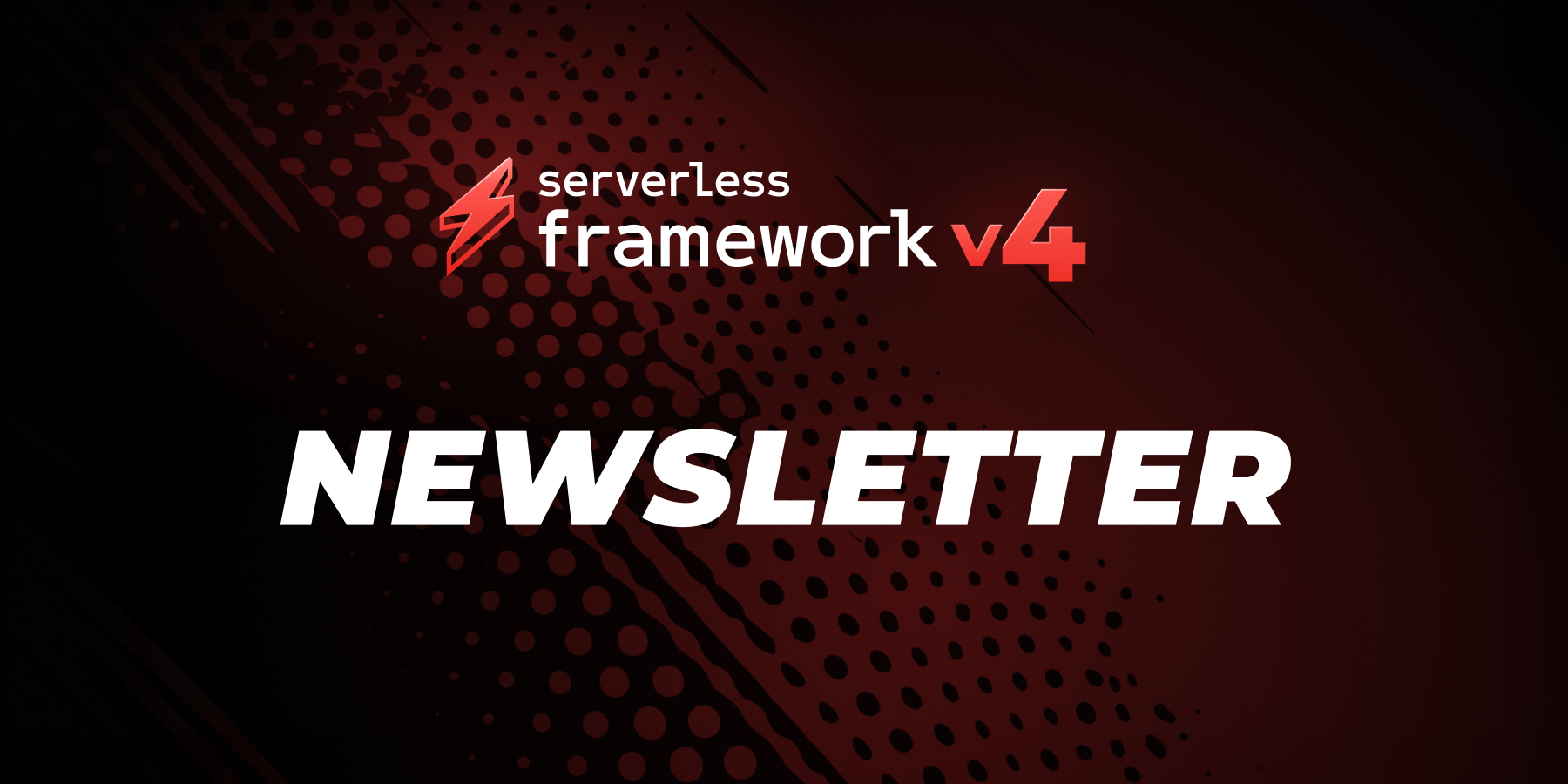We're thrilled to announce the v1.14 release of the Serverless Framework!
This release is yet another special one since we're officially announcing our Google Cloud Functions integration with the Serverless Framework.
But this isn't the only thing we've been working on. Let's take a look at the full feature set v1.14 introduces.
Highlights of 1.14.0
Note: You can find a complete list of all the updates in the changelog.
Google Cloud Functions support

We're proud to announce official support for deployment the the Google Cloud Platform with the help of our Google Cloud Functions Provider plugin.
Adding the google integration strengthens the multi-provider support of the framework and gives you a 4th provider to choose from when building your next serverless project.
Curious how to get started? Let's take a look!
The easiest way to get started is to follow our quickstart guide in our docs.
You might also want to check out our Google HTTP endpoint example in our Serverless Examples repository.
Protip: Google offers a free $300 credit if you create a Google Cloud account via their Free Trial link.
Rollback function support
The Serverless Framework has offered the rollback command, which rolls your stack back to a specific state, since version 1.1.0. This command has proven very popular as a way of rolling back infrastructure changes.
However shortly after we released this command it became apparent that it was not ideal for cases in which users only want to rollback code changes for a single function. Creating an entirely new stack is slow, inconvenient, and overkill for this simply rolling back a single function.
With Serverless v1.14 we're excited to add support for quickly and easily rolling back single functions to a specific version.
Let's take a look at an example to see how this works in practice.
Let's say we've accidentally ran a serverless deploy which updated our functions code and introduced a bug.
First we could take a look at all the functions and their available versions for the service that we're working on by running deploy list functions
serverless deploy list functionsWe can see that our latest versions is 15 so we want to rollback our function to version 14.
Next up we simply run:
serverless rollback function -f hello -v 14This will roll back our function hello to version 14.
Important: Rolling back a single function is an operation which should be used in an emergency situation as it might put the stack into a non atomic state. Serverless will directly push the function code into the function without going through a whole stack deployemnt through CloudFormation (which will be significantly slower).
It's recommended to issue a serverless deploy with the updated / fixed code some time after rolling back to put the service into a stable state again.
Note: Lambda versioning needs to be enabled to use this feature. Serverless automatically adds versioning support for your Lambda functions unless you've opted out. See our docs for more information on Lambda versioning.
DeadLetterConfig support
With Serverless v1.14 you can use DeadLetterConfig support natively in Serverless.
We've implemented the onError config parameter which you can specify at the function level. All you need to do is plug in your SNS topic arn and re-deploy your stack.
Once done you can react to failed Lambda calls with your SNS topic.
Here's an example configuration to showcase the usage:
service: service
provider:
name: aws
runtime: nodejs6.10
functions:
hello:
handler: handler.hello
onError: arn:aws:sns:us-east-1:XXXXX:testYou can read more about this feature in our docs.
Note: Serverless currently only supports sns topic arns due to a race condition when using SQS queue arns and updating the permissions in the IAM role. We're currently looking into this so that we can add support for SQS topic arns soon!
Login command
We're excited to introduce the serverless login & serverless logout commands for the Serverless CLI.
We are adding these commands in preparation of our upcoming platform release.
Run serverless login to create your account.
serverless loginIf you already signed up for a beta account, you can connect the CLI with your beta account with the sls login command.
The login functionality also will give us the power to personalize & improve the framework onboarding experience. Our mission is to help users learn and adopt the serverless ecosytem as fast as possible!
We are investing heavily on improving the overall developer experience of the framework and would love to hear your thoughts on other UX/DX initiatives
Support for s3 variables
Serverless v1.14 adds another Serverless Variable called s3. This enables a way to reference values in a S3 bucket (e.g. stored credentials).
Here's how you can use this new Serverless Variable in your serverless.yml file:
service: service
provider:
name: aws
runtime: nodejs6.10
environment:
myKey: ${s3:my-bucket/my-key}
functions:
hello:
handler: handler.helloYou can read more about this feature in our docs about Serverless Variables.
More API Gateway integration types and AWS_IAM auth support
The http event definition was updated and now supports the HTTP, HTTP_PROXY and MOCK integration types:
functions:
create:
handler: handler.create
events:
- http:
path: test/create
method: GET
integration: mock
request:
headers:
Content-Type: "'application/json'"
template:
application/json: '{ "statusCode": 200 }'
response:
headers:
Content-Type: "'text/html'"
template: "Hello World"
statusCodes:
200: # headers and templates defaults to the values defined above
pattern: ''Furthermore you can use the aws_iam authorization type:
functions:
create:
handler: handler.create
events:
- http:
path: create
method: POST
authorizer: aws_iamMore information about all the new config parameters can be found in our API Gateway docs.
Access to IS_LOCAL environment variable during local invocation
Ever faced the situation where you've invoked your Lambda function locally with the invoke local command and accidentally triggered a request against a service which should only be used in production?
Serverless v1.14 has you covered and adds a IS_LOCAL environment variable which is available during local invocation.
Here's an example how you can use this feature:
'use strict';
module.exports.hello = (event, context, callback) => {
if (process.env.IS_LOCAL != 'true') {
// send some analytics data to the tracking system used in production
sendAnalytics({
some: 'data',
});
}
// ... normal processing
};Enhancements & Bug Fixes
This release also includes a bunch of bug fixes and several enhancements.
Thanks for reporting bugs and opening issues!
Contributors
This release contains lots of hard work from our awesome community, and wouldn't have been possible without passionate people who decided to spend their time contributing to make Serverless better.
Thank You to all of the contributors who submitted changes for this release:
- Alex Oskotsky
- Andre Rabold
- Doug Moscrop
- Frank Schmid
- Helen Yau
- Mark Chance
- Tom Saleeba
Get Involved
Serverless has a really helpful, vibrant and awesome community. Want to help us build the best Serverless tooling out there?
Contributing isn't just about code! Chime in on discussions, help with documentation updates or review Pull Requests.
Just filter by our labels such as easy-pick, help-wanted or needs-feedback to find areas where you can help us!
Furthermore, we're always seeking feedback from our community to build the features in the best way possible. Here's a list with issues where we need your feedback and insights in your real world usage of Serverless.
Next Steps
We've already started filling in the next milestones. Check out the 1.15 milestone to see what we have planned for the next release.
We hope that you like the new release! Let us know if you have any questions or feedback in our Forum or GitHub Issues.
Serverless Examples
The Serverless Examples Repository is an excellent resource if you want to explore some real world examples and learn more about what Serverless architectures look like.
Serverless Plugins
Serverless provides a completely customizable and pluggable codebase. Our community has written a vast amount of awesome plugins you can install and therefore enhance the capabilities of the Framework.
A list with all the different plugins can be found at our Serverless Plugins Repository.
Don't hestitate to open up a PR over there if you've authored or found a new Serverless plugin!


